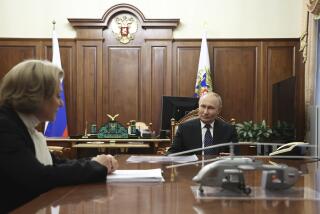Russia Will Have Army All Its Own : Military: Yeltsin issues decree, makes himself the commander in chief. He plans volunteer force.
- Share via
MOSCOW — President Boris N. Yeltsin issued a decree Thursday creating Russia’s own armed forces and making himself commander in chief, and he immediately ordered plans drawn up for the mighty force’s reduction and conversion to a volunteer army.
Yeltsin’s decree means the task of reshaping and cutting the ex-Soviet armed forces quartered in and outside Russia--troops who still wear the Soviet hammer and sickle on their hats--can begin in earnest.
The orders also responded to the deep need felt by leaders in Moscow to give back to their homeland, once again independent, all the attributes of a nation-state, including a revival of the army that defeated Napoleon Bonaparte and fought alongside the Allies in World War I.
Yeltsin had long resisted forming a separate Russian military, preferring a pooled force of all member republics of the ex-Soviet Union that joined the Commonwealth of Independent States.
But he changed his mind last month, when it became clear that Ukraine and other newly independent states were insisting on having armies and navies of their own.
Since the demise of the Soviet Union, morale has been rock-bottom in the ranks of what had been the Soviet armed forces, and Yeltsin’s action--significantly taken two days before the country celebrates the anniversary of victory over Nazi Germany in World War II--should do much to stop the sense of drift felt by those in uniform.
The creation of a Russian army theoretically does not affect the complicated command Yeltsin exercises over ex-Soviet nuclear weapons--in which the presidents of Belarus, Ukraine and Kazakhstan are also supposed to have a say but Yeltsin holds the button.
Although the Commonwealth joint military command remains theoretically in control of strategic matters, the existence of an independent Russian army seems fated to turn the former into little more than a NATO-like coordinating organ.
By his decree, it appeared that Yeltsin was taking direct command on Russia’s behalf of not only ex-Soviet units stationed in Russia but also others in eastern Germany, Poland, Mongolia, the Baltic states, the Transcaucasian republics, Moldova and Central Asia.
The Russian armed forces were put under the operational command of First Deputy Defense Minister Pavel Grachev, 44, who was promoted by Yeltsin to the rank of general of the army. He was given a month to develop an organizational plan for Russia’s new army and navy.
With the economy in ruins and the Kremlin no longer facing a hostile North Atlantic Treaty Organization on the other side of the East-West divide, Yeltsin has said that the manpower of the ex-Soviet army--which was around 3.7 million soldiers, sailors and aviators--should be brought down to 1.5 million and ultimately to 1.2 million.
The pronouncements of generals, however, made it clear that Yeltsin will have a fight on his hands. “Many units are so heavily understaffed that I am ashamed to cite figures,” Col. Gen. Leonty Kuznetsov, a member of the government commission on the formation of the Russian army, said in a newspaper interview.
Kuznetsov said military professionals want the armed forces maintained at about 2 million men until 1995 at least and then cut to 1.5 million by the year 2000.
Yeltsin empowered officials of the Russian Foreign and Defense ministries to negotiate with the other republics on the future status of ex-Soviet units now stationed there, and he prepared for negotiations on how to divide up the immense stocks of weapons and military facilities left behind by the Soviet Union.
Commenting on Yeltsin’s actions, Lt. Col. Anatoly I. Dokuchayev, an expert with the Krasnaya Zvezda military newspaper, said: “Two considerations played a key role in this decision: Russian national interests, plus the need to do something about the disintegrating Soviet army. . . . Morale is eroding, and fast. The men urgently needed a new identity.”
Sergei M. Shakhrai, Yeltsin’s top legal adviser, who asked to be relieved Thursday because of poor health, suggested in a newspaper interview that Yeltsin also may have acted to protect himself politically. Since last August’s failed bid at a conservative putsch, “the army was let to itself for too long and in time became an independent political force above the state,” Shakhrai said.
More to Read
Sign up for Essential California
The most important California stories and recommendations in your inbox every morning.
You may occasionally receive promotional content from the Los Angeles Times.













